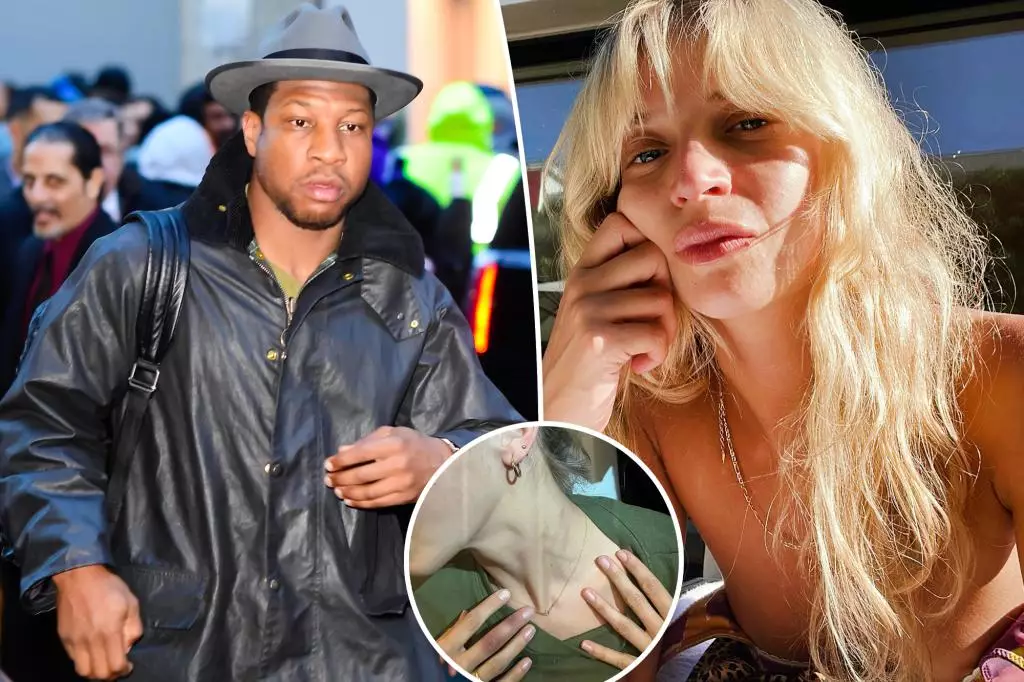Jonathan Majors, a promising actor whose trajectory seemed poised for greatness, is wrestling with the consequences of his past, notably reflected in newly surfaced audio recordings that unveil a chilling account of domestic violence. In these exchanges with his former girlfriend, Grace Jabbari, an uncomfortable truth emerges: the man famed for his roles in blockbuster films, including “Creed III,” is not just battling his on-screen personas but also confronting the ramifications of his off-screen actions. The gravity of these revelations warrants a closer examination, especially considering the wider implications for both the actor and the industry that has elevated him.
What unfolded in that audio discussion between Majors and Jabbari is not merely a personal dispute; it is a stark reminder that behind the glamor of Hollywood can lie shadows of brutality. Majors seems to express remorse, declaring his shame while simultaneously downplaying his violent behavior as an aberration. The words he chooses—admitting to “aggressing” his partner—convey a jarring disconnect. He grapples with his identity as a man perceived as gentle yet capable of inflicting harm, a duality that complicates both his narrative and ours.
A Disturbing Pattern
The troubling details of the audio recording, including Majors’ admission of choking Jabbari and his attempts to rationalize his actions, raise profound questions about accountability and personal responsibility in relationships. As Jabbari poignantly points out, the escalation of violence was not an isolated incident but rather part of an unsettling pattern. Majors’ justifications reveal a mindset that often blames the partner for provoking his aggression, a narrative all too familiar in the realm of domestic violence.
Following the infamous incident in March 2023 that culminated in a high-profile court case, the judicial outcome was mixed. Majors was convicted on certain counts while being acquitted on others, a verdict that leaves his reputation hanging in limbo. The fact that he avoided jail time may be viewed by some as indicative of a system that frequently favor male perpetrators, casting a long shadow on the societal commitment to protecting victims of domestic violence. Equally troubling is the punishment meted out—probation and mandated domestic violence intervention—although these steps are undeniably necessary, they often reflect a leniency that fails to fully address the gravity of the crime.
The Legal Battle and Its Broader Impact
As the legal aftermath of their breakup unfolds, with Jabbari filing a lawsuit against Majors for defamation, assault, and battery, the implications reach far beyond their personal relationship. This case shines a light on the pervasive issues of power dynamics within intimate relationships, particularly when one partner holds significant status. In addition, it raises critical questions about the entertainment industry’s role in addressing domestic violence, especially when a prominent figure is involved. Should the industry take a stand, or merely sidestep the discomfort?
The accusations against Majors entail not just physical harm but emotional manipulation, as Jabbari’s assertions of being thrown onto a car hood before enduring further violence at his hands detail both brutality and a severe breach of trust. The emotional scars left by such experiences remain long after the physical bruises have faded, which raises an urgent conversation about the long-term impacts of domestic abuse on survivors.
A Complex Path to Healing
In the midst of this turmoil, Majors has started a public journey toward healing. His recent admission of enduring sexual abuse as a child illustrates yet another layer of complexity to his narrative—one that hints at deep-seated trauma and potential explanations for his later actions. This revelation might elicit sympathy; however, it does not absolve him of responsibility for his actions as an adult.
Moreover, Majors’ engagement to actress Meagan Good, after his tumultuous experiences, adds a confusing layer to his redemption arc. Many may wonder if he has genuinely addressed the underlying issues contributing to his behavior or if this new relationship signifies a mere attempt to restore his public image. For those advocating for survivors, the focus must remain on their well-being while examining how societal structures can protect and empower individuals in similar circumstances.
In examining Jonathan Majors’ recent journey—from accolades to allegations—one is left contemplating the duality of human nature, the intersections between victimhood and accountability, and the enduring need for societal change to combat domestic violence in all its forms.

Leave a Reply